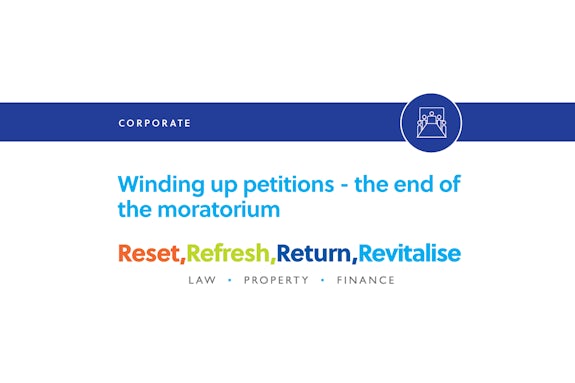
By David Winnie
May 20, 2025

With the lifting of the moratorium from 1 October, will we see a resurgence in ‘Zombie’ credit companies? Act now to help your clients survive.
The arrival of COVID 19 has materially impacted businesses. The Government rightly reacted to support companies by taking numerous measures to ease financial and creditor pressure on companies to try and allow them to continue trading in financially challenging circumstances. However, an imminent key change to one of these measures is the release of the moratorium (freezing) on creditor winding up petitions after 30 September 2020.
A key tool in any creditor’s armoury is the threat of making a winding up application for a due debt. The Corporate Insolvency and Governance Act 2020 brought in a blanket freeze on such creditor petitions unless the creditor could show that COVID 19 had not had a financial effect on the debtor company.
The problem for creditors in presenting such a petition has always been knowing, in fact, whether the debtor company is “good for” for the money or not. There is a balance between the time, effort and money spent by a creditor in pursuing a debt, and the risk that, even if successful, the debtor company will not be able to pay the debt and costs. Appointing a liquidator is always a last resort, but with creditor pressure effectively put on hold during lockdown, there could well be a resurgence of such “Zombie” creditor companies who just can’t pay.
As your client’s trusted advisor, you should make sure that your creditor clients are aware of debts becoming older without the ability to pursue them. There are lots of things that your client can do beyond the scope of a winding up petition to better their position. Equally, if your debtor client has a payment plan with another party, they must make sure that the agreement is properly nailed down. If they have only made a proposal but it’s not yet been agreed the risk as of 1st October is that the creditor can pursue your client much more aggressively than just now.
Looking forward, this lifting of the moratorium on creditor petitions, together with deferred tax payments becoming payable, the end of the furlough scheme, interest and capital payments under CBILS and bank facilities and the soon to be reinstated Crown preference on debts in insolvency, as well as the continuing uncertainty of lockdown and revenue generation are all going to have a significant impact on the business landscape. Businesses with cash will find deals and compromises can be done, but cash struggling businesses are likely to find 2021 even more difficult.
We provide our clients with advice on all of the above issues so feel free to pick up either with your own in-house insolvency/restructuring team, or with any of our partners if you want to have a chat through these issues. And as always the best advice is to get good advice early!
If you would like further information on the topic discussed in this article, please contact Steven Jansch by email: sjansch@gilsongray.co.uk or by phone: 0131 516 5361 / 07841 920 100. You can also view Steven’s profile by clicking here.
The information and opinions contained in this blog are for information only. They are not intended to constitute advice and should not be relied upon or considered as a replacement for advice. Before acting on any of the information contained in this blog, please seek specific advice from Gilson Gray.